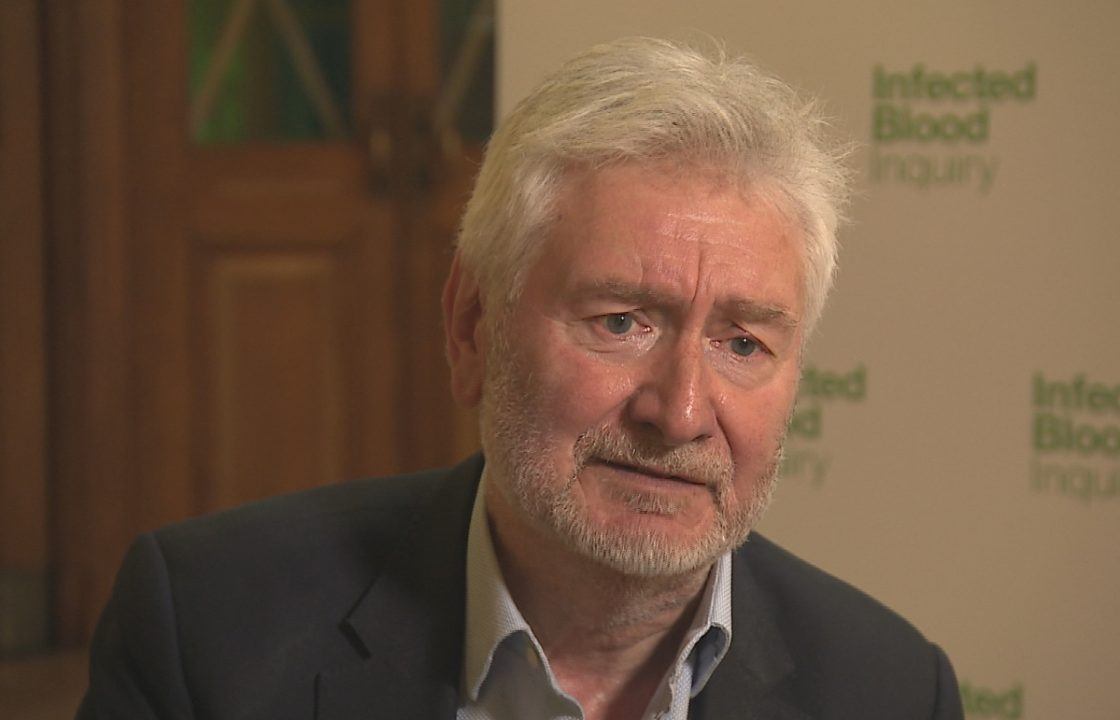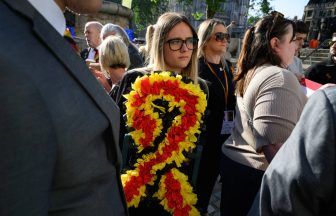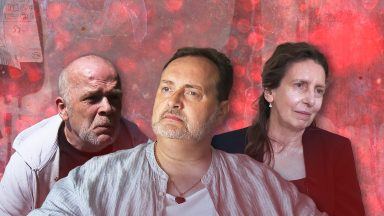The publication of the Infected Blood Inquiry report sparked mixed emotions for John McDougall.
His son Euan died from Aids in 1994 after receiving contaminated blood during treatment at Yorkhill Children’s Hospital in Glasgow.
The final report was critical of decisions at Yorkhill that saw children with haemophilia receive plasma products sourced from paid donors in the United States, despite these being known to be high-risk.
In all, 21 children become infected with HIV at the hospital – including Euan.
John said: “The report talks about the utter, utter unacceptability of the treatment of patients at Yorkhill. It can’t get much worse than that really, it’s hard to imagine a description that’s more damning
“From what I’ve seen of the report so far today, I feel vindicated.
“Ten, 20 years ago, I would not have thought this day would arrive. To that extent, I’m really pleased that it’s here, that we’ve been able to come here and bring this chapter to its conclusion.
“On the other hand, the people I should be with are not here. My son died in this tragedy, my brother-in-law died in this tragedy and my wife (Kate) died as a consequence of this tragedy, so satisfied to be here but sadness to be alone.
“These were not mistakes, these were egregious, horrendous blunders that lasted year-after-year, decade-after-decade and they were based on a series of conscious decisions that people were making.
Prime Minister Rishi Sunak told MPs in the House of Commons on Monday: “This is a day of shame for the British state.”
He said: “Today’s report shows a decades-long moral failure at the heart of our national life – from the National Health Service to the civil service, to ministers in successive governments, at every level the people and institutions in which we place our trust failed in the most harrowing and devastating way.
“They failed the victims and their families and they failed this country.”
Sunak also promised to pay “comprehensive compensation” to those affected and infected by the scandal.
“Whatever it costs to deliver this scheme, we will pay it,” he added, saying details would be set out on Tuesday.
Speaking prior to Sunak’s apology, John told STV News that “an apology is better than no apology”.
He said: “We’ve spent decades without an apology, so to that extent I am grateful.”
‘It’s felt like a pilgrimage to the truth’
Bruce Norval, a factor IX haemophiliac, travelled to London for the publication of the report on Monday and said it felt like “a pilgrimage to the truth”.
“A truth well overdue but it has felt strangely different this time,” he added.
Bruce, from Inverness, was diagnosed with Hepatitis C aged 23 from contaminated blood products.
Many victims were exposed to contaminated blood through transfusions, whereas others – including Bruce – were infected after receiving NHS treatment for haemophilia.
He said: “I’ve spent a lot of time in the last couple of weeks preparing for this, thinking about friends that were lost, thinking about friends that should be here, so coming here today has felt very much like a duty.
“I was exposed to viruses from my first-ever treatment. When I was diagnosed as having Hepatitis C I was training to be a nurse, so I sat across from a doctor who was lying to me and I knew he was lying to me in every word.
“So the moment I was diagnosed in 1990 I became a campaigner because I knew I was being lied to. It’s taken over my entire life. As my daughter said the other day there, who is 34, it’s been her entire lifetime, my wife was five months pregnant with her when I was diagnosed.
“It’s been my son’s entire lifetime at (the age of) 27. But when we talk about lifetimes, it’s 3,500 dead people’s lifetimes.”
‘So much suffering and death’
The inquiry concluded from early 1983 that decision-makers in Scotland knew of the risks but, due to a lack of knowledge, their response was insufficient and too slow.
Thompsons Solicitors, which represented 300 individuals and two charities in the Infected Blood Inquiry, said the “hard-hitting” report set out a number of Scotland-specific failures that led to “so much suffering and death”.
These included, the firm said, failures in Scottish blood transfusion services in the 1980s and numerous “missed opportunities” to remedy the injustices brought about by the scandal.
The infected blood scandal saw thousands of patients becoming infected with HIV and hepatitis C after being given contaminated blood products in the 1970s and 1980s, with around 2,400 people dying.
It is estimated that around 3,000 people in Scotland were given contaminated blood, whether through NHS transfusions or as part of haemophilia treatment, with hundreds subsequently dying.
A statement issued on behalf of the NHS in Scotland said: “Our deepest sympathies are with the patients who were infected by the use of blood products and their loved ones.
“We sincerely apologise for the historical failings described in the Infected Blood Inquiry and empathise with the impact these events had on infected and affected people.
“We welcome the publication of this Inquiry, and we would like to thank the Chair and staff for the work undertaken to produce this comprehensive report.
“Modern safety standards are rigorous, and significant advancements in screening and testing protocols have been made since the events that have been the subject of this Inquiry. All donated blood then undergoes thorough testing before being used for transfusions.
“NHS Scotland is committed to ensuring lessons from these events have been learned as we continue to prioritise a safe and sustainable blood supply across Scotland.”
Follow STV News on WhatsApp
Scan the QR code on your mobile device for all the latest news from around the country































